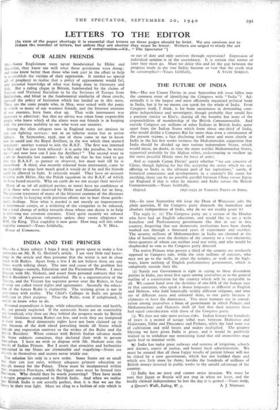INDIA AND THE PRINCES
Sul,—As a State subject I hope I may be given space to make a few :omments on Mr. R. G. Shahani's article. I see very little real know- ledge in the article and thus presume that the writer is not in close touch with Rulers. Apart from a few I do not believe there are any States worth talking about. The root and cause of the problem lies m two things—namely, Education and the Paramount Power. I must disagree with Mr. Shahani, and assert from personal contacts that the British Resident's powers are unlimited. He is a representative of the Viceroy, and the Viceroy has supreme power over the Rulers, in face of what are called treaty rights and agreements. Secondly the educa- tion of the future Ruler is deplorable. The training given is not in accordance with reality. The Chief's Colleges in India are grossly mefficient in their purpose. Thus the Ruler, even if enlightened, is unable to know what to do.
Personal expenditure is large, while education, sanitation and health, &c., are grossly neglected. If the autocratic States are an essentiality and beneficial, why then are they behind the progress made by British India? Geniuses among Rulers are few, and even they are hampered in their way. Real democratic rights have not been claimed up to now because of the dark cloud prevailing inside all States which forbade any expression contrary to the wishes of the Ruler and the British Resident. When contact with British Indian advance made the State subjects conscious, they declared their wish to govern themselves. I have no wish to dispute with Mr. Shahani over the morals of Indian Princes. But I assert that atrocities and barbarities Committed in the Slates are abominable and stupefying—States are madels in themselves and secrets never trickle out.
The solution lies only in a new order. Some States are so small that they can just exist, without adequate primary education or enough money for the Palace. These must be incorporated within their respective Provinces, while the bigger ones must be formed into Provinces. Why should they be worth preserving? They have made meagre progress compared to British India. And when we realise that British India is not actually perfect, then it is that we see the States in their true light. Must we ding to a fashion of rule which is so out of date and only survives through repression? Expression of individual opinion is in the ascendancy. It is certain that sooner or later they must go. Must we delay this and let the gap between the progress made in the two Indias become so vast that the crash may be catastrophic?—Yours faithfully, A STATE SUBJECT.


























 Previous page
Previous page